
Movies
SBM Awards
Top Ten Films of the Decade
Filed under: SBM Awards

Deciding on only ten favorite films over the course of ten years is an arduous task. While my selection criteria relied on a variety of factors, in the end, my ultimate guide was personal preference. Undoubtedly, many will feel certain films were unfairly left out, but there truly is no objective way to make a list of this nature. Please feel free to comment and share your opinions regarding the best films of the decade.
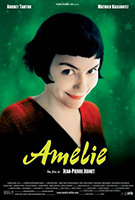 10. Amelie (2001)
10. Amelie (2001)
Dir. Jean-Pierre Jeunet
While Amelie may not carry the same philosophical weight or thematic depth as many other entries on this list, it remains one of the most enjoyable and endlessly re-watchable films of the decade. By no means, however, is it mere popcorn entertainment. Jeunet creates an eccentric and magical universe replete with detail. The film has a Russian doll quality: inside every story, is another and another-each so intricately imagined it, at times, defies belief. Even American viewers embraced this film and I wouldn't doubt that for many it is the only French film they've ever seen. A matter a fact, I often think there must be something wrong with a film so well liked, something vulgar (in the archaic sense.) Every time I watch it again I expect something to grate-maybe its relentless cuteness or Amelie's quirky childlike naivety -but somehow it never does. It truly is one of those rare films that is both totally accessible and utterly brilliant.
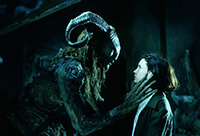 9. Pan's Labyrinth (2006)
9. Pan's Labyrinth (2006)
Dir. Guillermo del Toro
The last decade has been one of massive leaps in special effect technology. Out of all the visual bonanzas of recent years, Pan's Labyrinth is the best. Some might argue in favor of the Lord of the Rings trilogy but really it's just another epic in fancy clothes. Del Toro's film, in contrast, is spectacular to the eye and full of true insight. He captures the essence of childhood -- a world where reality and fantasy are indistinct. He also grasps the way the imagination synthesizes trauma and pain in order to deal with an unbearable reality.
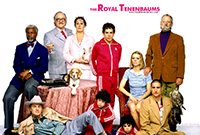 8. The Royal Tenenbaums (2001)
8. The Royal Tenenbaums (2001)
Dir. Wes Anderson
It always strikes me as something of an oddity that comedies, ever successful at the box office, never seem to make the cut on critical "best of" lists. Perhaps this is because they are perceived as less serious and thus less meaningful. It is my contention, however, that comedies often provide the best map of a culture, revealing its fears, insecurities and obsessions. The Royal Tenenbaums is the best film by one of the best comedic directors of our time. Anderson's films are distinguished by their array of eccentric characters that exists in his trademark anachronistic, curio-like world. Unfortunately, he has spawned a scourge of unsuccessful copycats (but this serves as proof of his massive influence.) Unlike Life Aquatic (2004), which relies heavily on special effects, or The Darjeeling Limited (2007), which is crippled by a surfeit of plot, Royal Tenenbaums centers exclusively on characters-which are truly what comedies are all about.
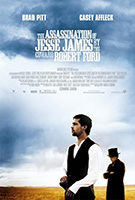 7. The Assassination of Jesse James by the Coward Robert Ford (2007)
7. The Assassination of Jesse James by the Coward Robert Ford (2007)
Dir. Andrew Dominik
After directing a single rather obscure film (Chopper, Australia, 2000), Dominik emerged out of nowhere to produce one of the best films of the decade. His timely commentary on celebrity succeeds both as a character study and a larger statement regarding the moral grey area created by hero outlaws. Serving as a testament of how the quest for fame twists the soul is Robert Ford. Played by Casey Affleck in career defining form, Ford is a contemptible opportunist, and yet, his shocking naivety and desire to please prevent him from becoming altogether unsympathetic. It is this ability to see the humanity of every aspect of this piece of history, a history often mired in legend, that makes this film great.
 6. Eternal Sunshine of the Spotless Mind (2004)
6. Eternal Sunshine of the Spotless Mind (2004)
Dir. Michel Gondry
Something penned by screenwriter Charlie Kaufman was bound to make the list -- Adaptation (2002) and his directorial debut, Synecdoche, New York (2008), were strong contenders -- but I feel Eternal Sunshine is most deserving of a spot on the "top ten." Out of the previously mentioned films, it is guilty of the least navel-gazing and is, as a result, his most accessible and emotionally viable work. Like all Kaufman films, it examines the inner-workings of the human mind but, in its inclusion of a love story, forgoes pure introspection in order to explore human connection. Gondry's sensibility coupled with his abstract visual style, stark and surreal at once, perfectly complement the material.
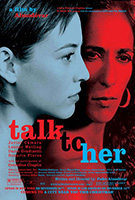 5. Talk to Her (2002)
5. Talk to Her (2002)
Dir. Pedro Almodóvar
While viewing Talk to Her, one cannot help but wonder if the Spanish master saved up all his best ideas for this single monumental work. Each frame of this film is exquisite: from the vivid cerise and ebony tableaus, to the beautifully choreographed bullfights and ballets, and finally, the Dali-esque silent film sequence where a man crawls inside his lover's vagina (somehow this manages to come off as erotic and heartbreaking as opposed to creepy). Unlike some of Almodóvar's other films, there is nothing of the art house soap opera about it. Rather, it is a deeply moving study of loneliness and the search for human connection.
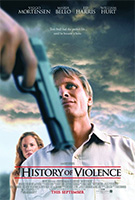 4. A History of Violence (2005)
4. A History of Violence (2005)
Dir. David Cronenberg
Like most Cronenberg films, A History of Violence examines the malleable nature of identity and the exchange between one's self-perception and the perception of the surrounding world. Unlike his former work, this film does not feature literal personifications of this conflict in the form of bizarre corporeal mutations and modifications (think The Fly (1986) and Dead Ringers (1988)). This time, the struggle is purely psychological, manifested in the soul as opposed to the body. As a result, it is all the more harrowing and certainly one of the greatest achievements of Cronenberg's distinguished career.
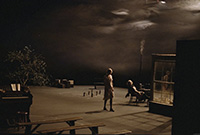 3. Dogville (2003)
3. Dogville (2003)
Dir. Lars von Trier
A sound argument could be made that von Trier is the consummate auteur of our time. Since co-penning the Dogme 95 manifesto, he has been one of the most recognized voices in avant-garde cinema, defying both audience and, at times, critical appreciation. His vision of "purity" is perhaps best realized in Dogville -- he strips down the mise-en-scene to a soundstage with chalk outlines designating buildings and the most basic assortment of props. He proves that fancy sets and special effects are not necessary to create a riveting film. In addition, he projects his transgressive ideologies and idiosyncrasies into the work (e.g. his underlying misogyny and sadistic preoccupations with humiliation, sexual violence and suffering). Despite the rampant negativity, there are moments of profound insight into the human condition and even the occasional glimmer of hope. While his tendency to dwell on the uglier aspects of existence makes von Trier unpalatable to many, something must be said for a filmmaker who so fearlessly reveals himself.
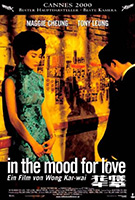 2. In the Mood for Love (2000)
2. In the Mood for Love (2000)
Dir. Wong Kar-wai
It is difficult to imagine a more beautiful film: an unconsummated love story that depicts the struggle between obligation and passion. The director's distinctive color palette and atmospheric lighting characterize the feeling of intense longing that permeates every scene. Each glance, each gesture, each object is filled with infinite meaning. Like life itself, it is a film made up of small details and casual interactions that only form a story over a stretch of time. It is rare to see style in no way encumber the emotional resonance of a film, but such is the case with In the Mood for Love. Though on the surface it appears reserved in the manner of much of Chinese cinema, beneath, it seethes with an ocean of feeling.
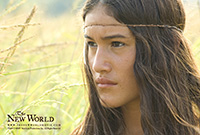 1. The New World (2005)
1. The New World (2005)
Dir. Terrence Malick
Not only is this my number one film of the decade, but my favorite film of all time. As with anything one truly loves, it is impossible to describe the essence of the thing; to, in other words, deconstruct the thing to flush out those elements which make it "lovable." Esteemed playwright and star of Malick's Days of Heaven (1978), Sam Shepard, once described the director's films as visual poems -- something one feels as opposed to understands. This is perhaps the most apt description of The New World. However, I will venture a justification or at least attempt to describe the film's emotional impact despite its inevitable facileness.
The most immediate emotion evoked while viewing the film is one of loss; or, more specifically, grasping something in one's hand only to find it slowly disintegrating and falling through one's fingers like ashes. Representing what we have lost is the character of Pocahontas. Q'orianka Kilcher's transcendent (if not necessarily historically accurate) portrayal of the controversial figure embodies the best aspects of humanity: generosity, love, hope, and serenity. Her innocence is contrasted with the demands of "civilization": ambition, hate, violence, and disharmony, to name a few. One could, of course, interpret this as a statement about the ills of western civilization or the destructive nature of colonization, but I prefer to look at it on a more individual level. We see ourselves as born innocents slowly corrupted by the desires thrust upon us by society for acquisitions, sex, and prestige. The film suggests that at the core there is an innate purity that remains -- a self that can simply experience life without regrets of the past or fears of the future. It is this sense of hope, this absence of cynicism, this belief in humanity that moves me. While I often find this view of mankind difficult to wholly believe, I really, really want to.
Tags: top 10, awards, 2000-2009, The New World, In the Mood for Love, Dogville, A History of Violence, Talk to Her, Eternal Sunshine of the Spotless Mind, The Assassination of Jesse James by the Coward Robert Ford
Related Posts
- Detecting the Marvelous - Straight to the Top 10
- The 10 greatest moustaches in film and television history (plus a few more)
- Tony's Top Ten: Best Films of 2014
- Tony's Top Ten: Best Films of 2013
- Andrew's Top Ten: Best Films of 2013




Original Comments Posted (3)
David A. Robertson says...
I like many of the films in your list, including ESOTSM and Pan's. I love Malick, all of his work, and the description of his work is apt. I've always felt that his movies are poems, and beautiful ones. One of the many examples of this are the length of shots in his movies, which are sometimes triple the average in an average movie. I have to argue with you on one thing, however, and that's with your preference to interpret the movie on an individual level. I believe the point of this movie, as it should be, is colonization. It does this through widening the lens first, and then zooming in on Pocahontas. Her qualities, that of generosity, love, etc, are embodimients of the Aboriginal culture. You see this in a pre-contact society: the importance is on family, community...this includes generosity, working and surviving together. It's the opposite of Western mentality, individualism, greed, whatever. Of course, the beauty of poetry is that one can interpret it however they want, and it means something differently to each person.
Jan 18, 2010 7:23pm
ariana says...
Interesting. I always felt that The New World got a bad rap and/or was underappreciated.
Jan 26, 2010 3:33pm
crimson says...
The only movie in the list that I watched was Amelie. It's really a one of a kind movie that got me interested in watching foreign films. It also made me glad that I spent a part of my childhood in frenh immersion.
Jan 31, 2010 11:24pm
Comments Posted (